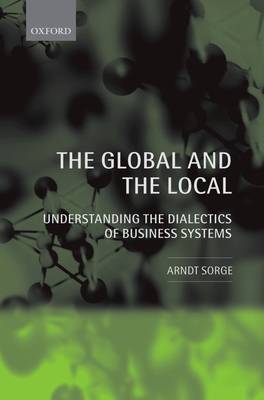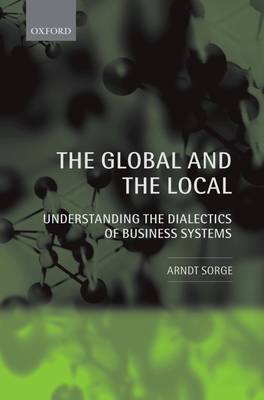
- Afhalen na 1 uur in een winkel met voorraad
- Gratis thuislevering in België vanaf € 30
- Ruim aanbod met 7 miljoen producten
- Afhalen na 1 uur in een winkel met voorraad
- Gratis thuislevering in België vanaf € 30
- Ruim aanbod met 7 miljoen producten
Zoeken
The Global and the Local
Understanding the Dialectics of Business Systems
Arndt Sorge
Hardcover | Engels
€ 145,45
+ 290 punten
Uitvoering
Omschrijving
The rhetoric of internationalization and globalization often suggests an inexorable move away from domestic cultural and institutional differences. Yet the development of internationalization within individual nations has been shaped by those very domestic institutions and cultures, as 'best practice' or other kinds of international learning have been translated into established practice and knowledge.
In this important study, Arndt Sorge presents a sociological theory of the development of human societies to explain how business systems evolve and change, and how internationalization works to specify and change societal identities within nations. Examining changes in work, organization, corporate governance, and human resources, Sorge shows how this interaction is a pattern that has been followed over centuries. Indeed, amongst the cases Sorge presents, he concentrates on the example of Germany, a supposedly highly homogeneous and closed society, as evidence for the universality of shifting borders, expanding horizons, local adoption and adaptation of global practices, and the hybridization of systems and standards, as the normal course of social evolution.
Arndt Sorge's analysis of globalization combines rigorous theoretical reasoning with empirically-grounded analysis, and deliberately adopts a general social science approach, drawing on research from Business and Management Studies, Sociology, Political Science, and History.
In this important study, Arndt Sorge presents a sociological theory of the development of human societies to explain how business systems evolve and change, and how internationalization works to specify and change societal identities within nations. Examining changes in work, organization, corporate governance, and human resources, Sorge shows how this interaction is a pattern that has been followed over centuries. Indeed, amongst the cases Sorge presents, he concentrates on the example of Germany, a supposedly highly homogeneous and closed society, as evidence for the universality of shifting borders, expanding horizons, local adoption and adaptation of global practices, and the hybridization of systems and standards, as the normal course of social evolution.
Arndt Sorge's analysis of globalization combines rigorous theoretical reasoning with empirically-grounded analysis, and deliberately adopts a general social science approach, drawing on research from Business and Management Studies, Sociology, Political Science, and History.
Specificaties
Betrokkenen
- Auteur(s):
- Uitgeverij:
Inhoud
- Aantal bladzijden:
- 316
- Taal:
- Engels
Eigenschappen
- Productcode (EAN):
- 9780199278909
- Verschijningsdatum:
- 2/06/2005
- Uitvoering:
- Hardcover
- Formaat:
- Genaaid
- Afmetingen:
- 156 mm x 234 mm
- Gewicht:
- 625 g

Alleen bij Standaard Boekhandel
+ 290 punten op je klantenkaart van Standaard Boekhandel
Beoordelingen
We publiceren alleen reviews die voldoen aan de voorwaarden voor reviews. Bekijk onze voorwaarden voor reviews.











